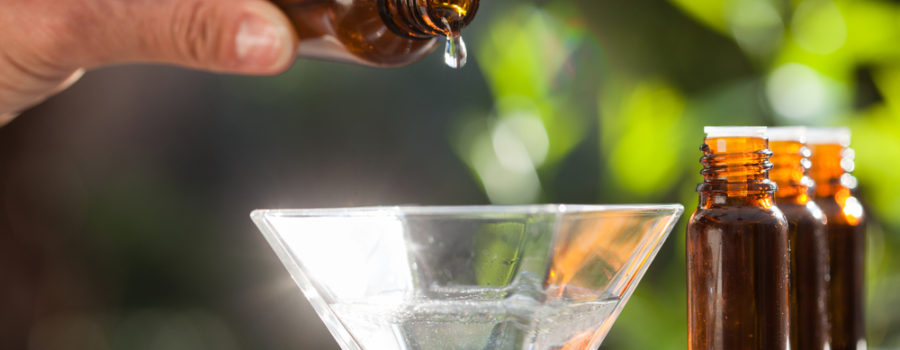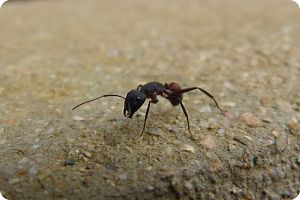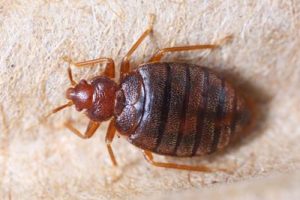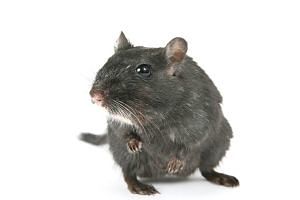Essential oils contain natural scents that can help repel and control many pests from biting us or entering our home. These scents work in a couple of different methods. The scent either can block the receptors the bugs use to find us (or our food), or the pest just doesn’t like the smell!
Some of these pests – to name a few – are mosquitoes, gnats, biting flies, ants, moths, dust mites, rodents, birds, and even raccoons.
Peppermint essential oil to control pests
Many pests don’t like the smell of mint, especially peppermint. Peppermint oil smells great to humans and is a good alternative to commercial pesticide. It is a natural insecticide that repels mosquitoes, flies, ants, beetles, and more. In addition, it deters raccoons, woodpeckers, and mice. Birds don’t have strong lungs and therefor don’t like strong scents such as peppermint oil.
An easy way to help repel and deter insects, rodents, birds, and wildlife is to create a peppermint oil spray.
Peppermint Oil Spray
Mix several drops of peppermint essential oil and water in a small spray bottle. Shake well. The oil will tend to separate from the water. Always shake before applying. Spray the mixture wherever you’re having the pest problem.
If this isn’t working, increase the amount of peppermint oil in the water up to a 50/50 ratio. For example mix 2 Tablespoons peppermint oil with 2 Tablespoons water. Shake well and spray.
Peppermint Oil Cotton Balls
Apply at least 5 drops of peppermint oil on a cotton ball. The stronger the scent the better. Place it in various spots around your home or business where pests are entering. This can help repel insects and rodents. It is important for the pests to smell the peppermint before they enter the building. Refresh the peppermint oil cotton balls at least once a month.
The peppermint cotton ball will mask the pheromone trail of rodents. The pheromone trail is what attracts other rodents. It shows them the pathways into your home or business.
Concentrated Peppermint Oil
For woodpeckers, try dabbing concentrated peppermint oil where you see the woodpeckers pecking. They are going after the insects living on your house or business. You will end up repelling the woodpecker and the insects.
Interesting research on Peppermint oil
In March of 2011, the Malaria Journal published a study that discovered peppermint oil offered mosquito repellent action when applied to exposed areas of the body. In addition, the study demonstrated larvicidal properties. Mosquito larvae where killed after exposure to pure peppermint oil and water for 24 hours.
PubMed, an online scientific journal, published an article discussing the effectiveness of menthol against mosquitoes in particular. The study demonstrated that menthol used as a natural alternative to synthetic chemicals like DEET can be effective for human protection against mosquitoes.
Citronella essential oil to control pests
Citronella repels mosquitoes, flies, fleas, ticks, and a lot of other pests. It is a non-toxic biopesticide (biochemical). It is registered with the EPA as an insect repellent/feeding depressant and as an animal repellent.
Citronella oil is safe and very popular. It can be applied to your skin, burned in a candle, or sprayed in the air. If applying to skin, mix several drops of citronella in olive oil or sunflower oil. A little goes a long way. If you can smell it, so can the bugs.
Citronella oil is on the U.S. Environmental Protection Agency’s list of minimum risk pesticides. However, citronella oil should not be used on children less than six months old unless directed by a physician. This information is listed on the product label.
Tea tree essential oil to control pests
Tea tree oil is another potent scent to help repel pests. It smells good, very similar to pine, and works well to ward off ants, mosquitoes, and ticks.
Soaking a rag in a tea tree oil and water mixture is the best way to use it. Put the soaked rag up high so that children or pets can’t reach it. Do not apply to your skin or ingest. Too much tea tree oil, which contains terpenes, whether ingested or absorbed through the skin is toxic. Do not use tea tree oil around pets such as cats or dogs. Pets tend to lick the oil and can become very sick. There is no antidote for tea tree oil poisoning.
When absorbed, tea tree oil may cause drowsiness, confusion, hallucinations, coma, unsteadiness, weakness, vomiting, diarrhea, nausea, blood cell abnormalities, and severe rashes.
Lemon Eucalyptus essential oil to control pests
Lemon Eucalyptus oil repels mites, fleas, and mosquitoes. In particular, lemon eucalyptus has provided some reliable results when it comes to preventing mosquitoes from biting, regardless of application style. Therefor it is considered one of the most effective natural mosquito repellant options available.
Homemade Lemon Eucalyptus Spray
2 tablespoons of either vodka or witch hazel
2 tablespoons grape seed oil, jojoba oil, almond oil, or olive oil
50 drops of essential eucalyptus oil
Mix the ingredients into a solution. Put into spray bottle and shake. Spray on skin.
Basil essential oil to control pests
Basil repels stinging insects, stink bugs, house flies, dust mites, and mosquitoes. It can be used as an insect repellent spray and, because it works on dust mites, it can be sprayed on bedding and pillows.
Homemade Basil Spray
1/2 cup distilled water
2 tablespoons vodka or witch hazel
20 to 30 drops basil essential oil
Mix the ingredients into a solution. Put into a spray bottle and shake. Spray on skin or linens. Store in refrigerator to keep fresh. Be sure to keep spray away from eyes, nose, and mouth.
More natural scents used to control pests in home or business
For pests that are entering your home or business, Busy Bee Cleaning Service advocates using essential oils as well as garlic, pepper, cucumber, hot sauce, and lemon peels. Pests do not like strong smells and therefor tend to stay away from them. Keep strong scents around your home or business, such as in the cabinets, pantry, and bathrooms.
Integrated Pest Management
Essential oils and other strong scents can be part of an Integrated Pest Management plan. Pests are persistent and will take advantage of almost any situation involving food, water, and shelter. It is very important to keep food cleaned up and out of their paths. If they don’t have something to eat, they won’t stay.
Another important aspect of pest management involves exclusion. If pests can’t take up house in or around your home or business they won’t stay. Always seal cracks, crevices, holes, and gaps that would let pests in. Exclusion provides a long-term, very effective method for keeping pests out and it is “safe” – no pesticide is used.
Integrated Pest Management is a long-term, effective, and environmentally sensitive approach to pest management. The Integrated Pest Management (IPM) program utilizes current and comprehensive information on the life cycle of pests and their interaction with the environment. This information, in combination with pest control methods, is used to manage pests by the most cost-effective means, and with the least possible hazard to people, property, and the environment. EPA
Call a professional
If homemade and DIY methods aren’t working or if the infestation is moderate to severe, it is best to call a professional pest control company. If the infestation is severe, essential oils and other scents probably will not be effective. Pests are very persistent and resilient . They are hard to deter, repel, and kill. Consider using DYI pest control for mild infestations or to prevent insects, rodents, and other pests from coming into your home before an infestation occurs.





Leave a Reply
Your email is safe with us.